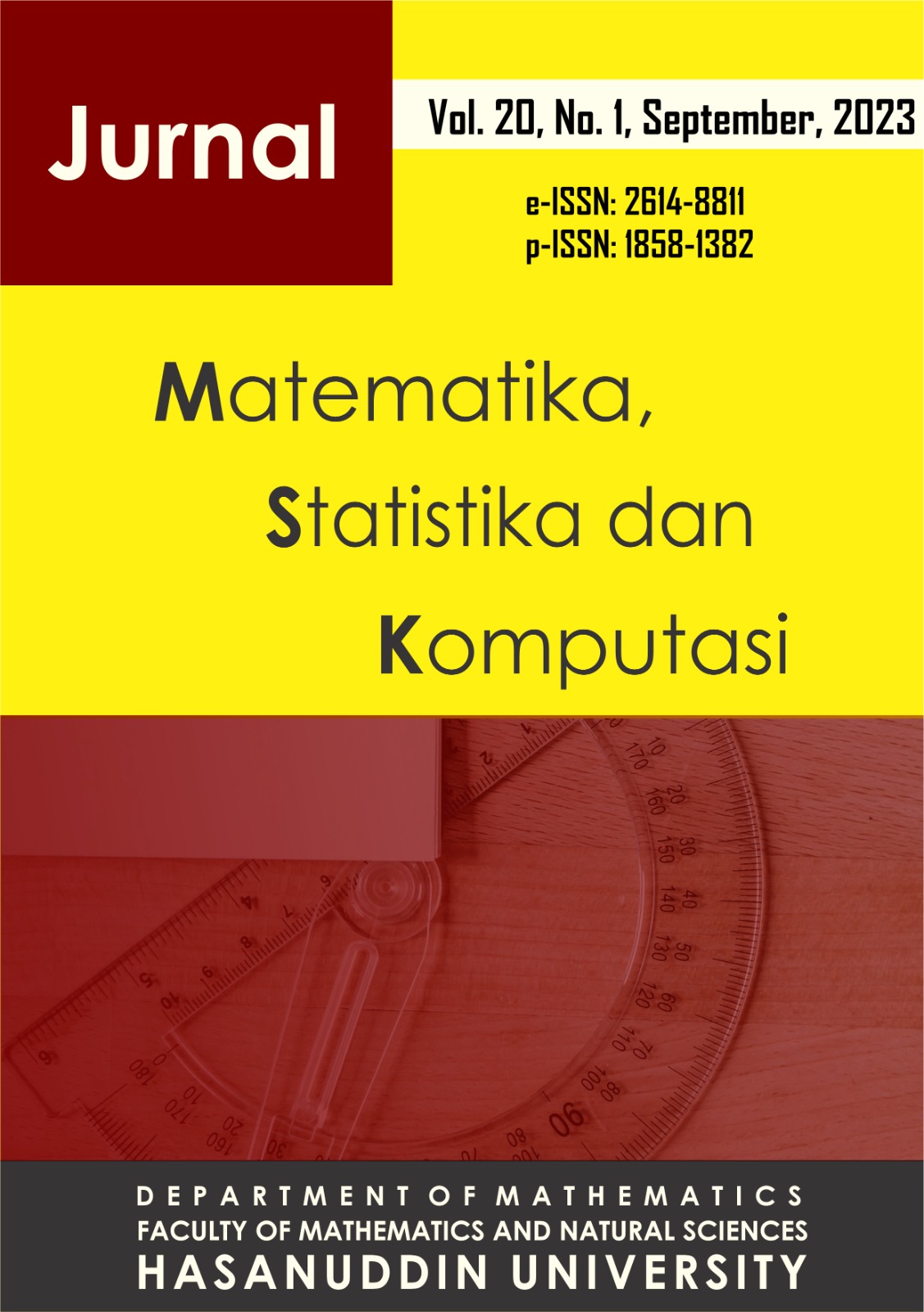The Application of the Long-Short Term Memory (LSTM) Forecasting Method on the Impact of Tropical Cyclones in Indonesia
DOI:
https://doi.org/10.20956/j.v20i1.27151Keywords:
isk management, forecasting, rainfall, wind speed, LSTMAbstract
Effective disaster mitigation strategies are paramount in the realm of risk management concerning natural calamities, with the primary objective of mitigating potential devastation. A pragmatic and impactful method involves predicting the contributory aspects of such disasters, encompassing variables such as torrential rainfall and formidable wind velocities that tropical cyclones bring. In this study, a comparative analysis of forecasting methodologies is undertaken, precisely the Long Short-Term Memory (LSTM) technique and the Holt Winter approach, both directed toward gauging the impact of tropical cyclones. This investigation focuses on two critical factors: the forecast of precipitation intensity and the estimation of maximum wind speed. The outcomes underscore the superior predictive capabilities of the LSTM method, unequivocally revealing its aptitude for predicting rainfall and wind speed. Impressively, the LSTM method yields remarkable precision levels of 97.433% for rainfall and an even higher accuracy of 99.018% for maximum wind speed forecasting. In essence, this study highlights LSTM's efficacy in disaster prediction with substantial accuracy.
References
Filipović, N., et.al., 2022. Regional Soil Moisture Prediction System based on Long Short-Term Memory Network. Biosyst. Eng., vol. 213, 30–38. doi: 10.1016/j.biosystemseng.2021.11.019.
Ng, C. S. W., Ghahfarokhi, A. J., & Amar M. N., 2022. Production Optimization under Waterflooding with Long Short-Term Memory and Metaheuristic Algorithm. Petroleum. doi: 10.1016/j.petlm.2021.12.008.
Nurhamidah, N., Nusyirwan, N., & Faisol, A., 2020. Forecasting Seasonal Time Series Data using the Holt-Winters Exponential Smoothing Method of additive models. Jurnal Matematika Integratif, 16(2), 151. https://doi.org/10.24198/jmi.v16.n2.29293.151-157.
Nurjani, E., Rahayu, A., & Rachmawati, F., 2015. Kajian Bencana Angin Ribut Di Indonesia Periode 1990-2011: Upaya Mitigasi Bencana. Geomedia Maj. Ilm. dan Inf. Kegeografian, vol. 11, no. 2, doi: 10.21831/gm.v11i2.3451.
Omar, M. S. & Kawamukai, H., 2021. Prediction of NDVI using the Holt-Winters model in high and low vegetation regions: A case study of East Africa. Sci. African, vol. 14, hal. e01020. doi: 10.1016/j.sciaf.2021.e01020.
Primandari, A. H., 2017. An Alternative Forecasting using Holt-Winter Damped Trend for Soekarno-Hatta
Osman, O., Rakha, H., & Mittal, A., 2021. Application of Long Short Term Memory Networks for Long- and Short-Term Bus Travel Time Prediction. https://doi.org/10.20944/preprints202104.0269.v1.
Lestari, N. A., Tyasnurita, R., Vinarti, R. A., & Anggraeni, W., 2022. Long Short-Term Memory forecasting model for dengue fever cases in Malang regency, Indonesia,” Procedia Comput. Sci., vol. 197, no. 2021, hal. 180–188. doi: 10.1016/j.procs.2021.12.131.
Liu, C., Sun, B., Zhang, C., & Li, F., 2020. A Hybrid Prediction Model for Residential Electricity Consumption Using Holt-Winters and Extreme Learning Machine,” Appl. Energy, vol. 275, no. June, hal. 115383, 2020, doi: 10.1016/j.apenergy.2020.115383.
Satriyabawa, I. K. M. & Pratama, W. N., 2016. Analisis Kejadian Puting Beliung Di Stasiun Meteorologi Juanda Surabaya Menggunakan Citra Radar Cuaca
Sinay, L. J., Pentury, T., & Anakotta, D., 2019. Peramalan Curah Hujan di Kota Ambon Menggunakan Metode Holt-winters Exponential Smoothing. Barekeng, vol. 11, no. 2, hal. 101–108.
Siswono, G.O., et.al., 2021. Application of Holt-Winter and Grey Holt-Winter Model in Risk Analysis of United States (US) Energy Commodities Futures Using Value at Risk (VaR). International Conference on Global Optimization and Its Applications 2021. Vol. 1. No. 1.
Suhardi, B., Adiputra, A., & Avrian, R., 2020. Kajian Dampak Cuaca Ekstrem Saat Siklon Tropis Cempaka dan Dahlia di Wilayah Jawa Barat. J. Geogr. Edukasi dan Lingkung., vol. 4, no. 2, hal. 61–67, 2020, doi: 10.29405/jgel.v4i2.4354.
Swapnarekha, H., Behera, H. S., Nayak, J., Naik, B., & Kumar, P. S. (2021). Multiplicative Holts Winter Model for Trend Analysis and Forecasting of COVID-19 Spread in India. SN Computer Science, 2(5). https://doi.org/10.1007/s42979-021-00808-0
Wibowo, D. S., Adytia, D., & Saepudin, D., 2020. Prediction Of Tide Level by Using Holtz-Winters Exponential Smoothing: Case Study in Cilacap Bay. 2020 International Conference on Data Science and Its Applications (ICoDSA). https://doi.org/10.1109/icodsa50139.2020.9212920.
Downloads
Published
How to Cite
Issue
Section
License
Copyright (c) 2023 Author and publisher

This work is licensed under a Creative Commons Attribution 4.0 International License.

This work is licensed under a Creative Commons Attribution 4.0 International License.
Jurnal Matematika, Statistika dan Komputasi is an Open Access journal, all articles are distributed under the terms of the Creative Commons Attribution License, allowing third parties to copy and redistribute the material in any medium or format, transform, and build upon the material, provided the original work is properly cited and states its license. This license allows authors and readers to use all articles, data sets, graphics and appendices in data mining applications, search engines, web sites, blogs and other platforms by providing appropriate reference.







